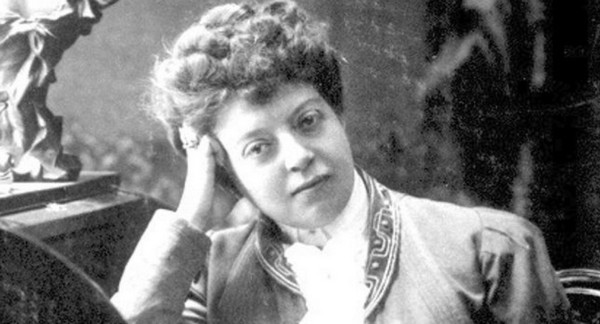
When we search among the Catalan modernist composers, we find great names such as Isaac Albéniz, Josep Anselm Clavé i Camps, Enric Granados, Enric Morera, Felip Pedrell, Eduard Toldrà, Joaquim Serra... without finding a mention to many women composers who were part of that time. This fact has been repeated throughout history, however nowadays, we are living an era that is waking up the voices of women that have had an important role, and therefore I have decided to contribute and share with you the figure of Carme Karr.
Carme Karr (Barcelona, 1865 - 1943) was a woman who influenced Catalan society at different levels. Daughter of a French father and an Italian mother, she adapted and integrated herself into the Catalan society as part of the Catalan cultural renaissance. Her vision of the French women, which enjoyed more rights than the Catalan one, awakened in her an interest in the situation of the women in Catalonia. Through her literary works, articles, lectures, compositions, she exercised a role of social criticism that offered alternatives to women, to the point she became so involved with feminism that in 1931 she represented the movement for women's suffrage, meeting with Francesc Macià to make official the demand for the right to vote.
She participated in magazines such as l’Avenç and Joventut in which she used pseudonyms, the best known "Escardot" ("Thistle"). In 1907, she became editor of the magazine Feminal, a supplement of the weekly magazine La Ilustració Catalana, which reflected the vital role of women in different fields. She also founded La Llar, a residence for teachers, students and also a school dedicated to the formation of women, thus offering an alternative to the convents that until then were the only residence in the big cities for women.
Also involved in the dissemination of women's rights, she gave several lectures on feminism and participated in the 1929 Barcelona International Exposition, being in charge of the Band for Women. One of the events she offered was the programming of a concert of exclusively female works performed by women. At the time it was announced as an exceptional event, as works by Catalan and European composers were performed.
Her musical work is mainly based on works for voice and piano with texts by contemporary poets, such as Apel·les Mestre, who was a great friend. Moreover, as Maria Teresa Garrigosa (2019) explains in her thesis, the harmonies of his compositions are apparently simple but with a rich and well-written melody for the voice.
In total, he wrote 27 songs and a zarzuela, El Testament de Amelia, which became a great success in its time. From 1907 to 1917, he published 13 of his songs in the magazine Feminal, in addition to publishing the works of young composers who began to stand out in the field of composition.
Looking for women composers and trying to find little known names, I was pleased to discover Carme Karr, feminist, writer and composer, who from literature and music exerted an influence on Catalan society, fighting for women’s rights. And to my biggest surprise, I found information about other composers that I hope that will be programmed in concerts along with other women composers.
Finally, I share with you a song that I love for their delicacy and depth, and that I will surely include in some concert program. It's called "Cançó de tarda" (Afternoon song, 1908), with text by Apel·les Mestre, from the cycle for voice and piano "Flors d'Escardot, cançons catalanes". The soprano is Maria Teresa Garrigosa who is also the author of the doctoral thesis "The Catalan composers of the 19th century: A creative impulse" (2019), which I recommend reading. The pianist is Heidrun Bergander.
De les vores del camins
L’escardot en fa jardins
Més, qui veu ses flors morades?
En els boscatges deserts
El merlot en fa concerts
Més, qui les sent, ses passades?
Déu te dó, flors, escardot!
Déu te dó, cançons, merlot!
Déu vos guard sublims artistes
Que esclateu joisosament
En cançons que ningú sent
i en flors que no han de ser vistes!
Déu vos guard, sublims artistes!
Déu vos guard, Déu vos guard!
From the edges of the roads
The weevil makes gardens
Plus, who sees his purple flowers?
In the deserted woods
The merlot gives concerts
Plus, who hears them, their steps?
God bless you, flowers, weevil!
God bless you, songs, merlot!
God bless you sublime artists
That explode joyfully
In songs that no one hears
and in flowers that are not to be seen!
God bless you, sublime artists!
God bless you, God bless you!
About the author: Anna Guasch is a Catalan soprano. She studied with Dolors Aldea at the Conservatori Superior del Liceu and is currently studying the Master of Lied at ESMUC. She combines teaching with concert activity.















Comments powered by CComment